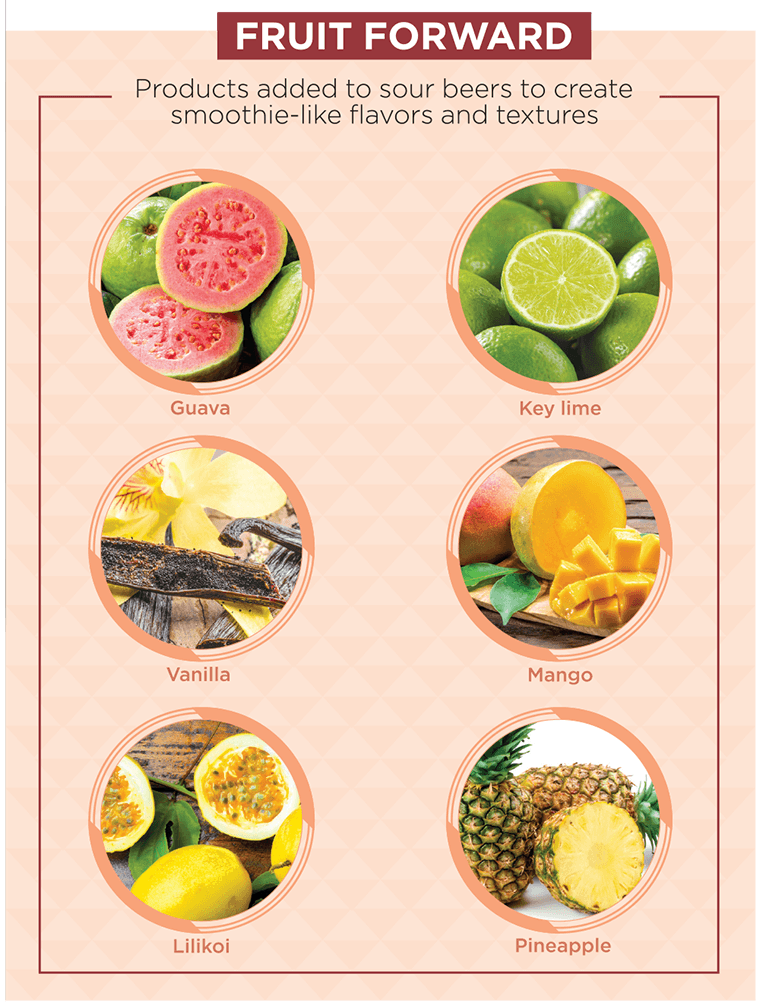Mango, banana, pineapple, guava and key lime. Sounds like a menu item at your favorite smoothie shop, but these fruits are all in beer! Brewers nationally and now locally have been pushing the boundaries of how much fruit you can add into a beer and drinkers are sucking them up.
The fruited sour is a growing trend nationally led by breweries like Drekker, 450 North, Skygazer and Evil Twin, and locally at Inu Island Ales, Hana Koa and Lokahi. We’re talking about beers with so much fruit they look and taste like juice with a slight balancing sourness. Massive amounts of fruit along with other sweet ingredients like vanilla, spices and even marshmallows, all called adjuncts, are added to these sour beers to create smoothie-like flavors and textures. These adjuncts were once looked down upon by brewers because they skewed traditions, but today they are freely experimented with and heavily used.
For many brewers it is all about experimentation and seeing how far they can push the limits. Josh Kopp, head brewer at Hana Koa agrees, saying, “There is no limit to what you can do. We like to see what works and experiment with what seem like ridiculous ingredients in ridiculous quantities.”
Fruit in sour beer is nothing new. The Belgians have been adding fruit to lambics for decades in kriek (cherries) and framboise (raspberries), while in Germany the uber tart and refreshing Berliner Weisse would traditionally get a shot of sweet syrup added just before serving.
The base of today’s modern fruited sour is a clean kettle soured beer, typically fermented with lactobacillus (the same culture used to make yogurt.) Without fruit, the beer is tart, tangy, with an almost lemony acidity. They are refreshingly sour and wake your taste buds up. From there, brewers add ridiculous amounts of fruit purée and other ingredients. Sometimes the amount of fruit can range 20%-40% of the total volume of the drink, according to Dan Coronado at Lokahi Brewing. The end goal is a beer that is over-the-top fruity sweetness, but with a balancing tartness.
Locally, a few breweries dove into this style with fans drinking them up. Over at Inu Island Ales, they have been experimenting with this style for years and the amount of fruit in each batch seems to grow and grow. These are beers that are thick with fruit purée, indulgently sweet and oh-so-colorful. Fruit combinations range from guava, key lime, banana, marshmallow and vanilla to mango, lilikoi and luau punch. At times, they can have up to three different fruited sours available at the tiny brewery, giving fans a wide variety.
Lokahi Brewing has found success as well with its heavily fruited sours. Recent release Xanadu combines pineapple, mango and lilikoi for a ripe tropical taste that finishes with a nice tartness.An early hit at the young brewery was The Floor is Guava, a wonderfully tart beer that was overflowing with guava. Coronado notes “That beer sold through faster than any other beer we had made. So we decided to give the people what they liked and we will continue to make them.”
Hana Koa Brewing uses a lighter hand on the fruit additions so the beers are not as thick, but the flavors still pop out of the glass. While tropical fruits are most commonly used by local breweries, Hana Koa has experimented with various berries. A recent release, Mermaid’s Spell, combines raspberry purée, vanilla and lactose for a vibrant deep red beer that tastes like a jar of jam.
But don’t be fooled into thinking these brewers are just mindlessly dumping fruit into beer. As Kopp at Hana Koa points out, “it takes a technique and a skill set to make these beers. You can’t just throw juice in and think it’s going to come out tasting great.” Done wrong, you could end up with a beer that tastes like cough syrup, he warns.
Certified cicerone Tim Golden is part owner of Village Bottle Shop & Tasting Room. Follow him on Instagram (@beerinhawaii) and check him out as co-host of “The Art of Beer” wherever you get your podcasts. Tim’s column appears every third Wednesday in Crave.




